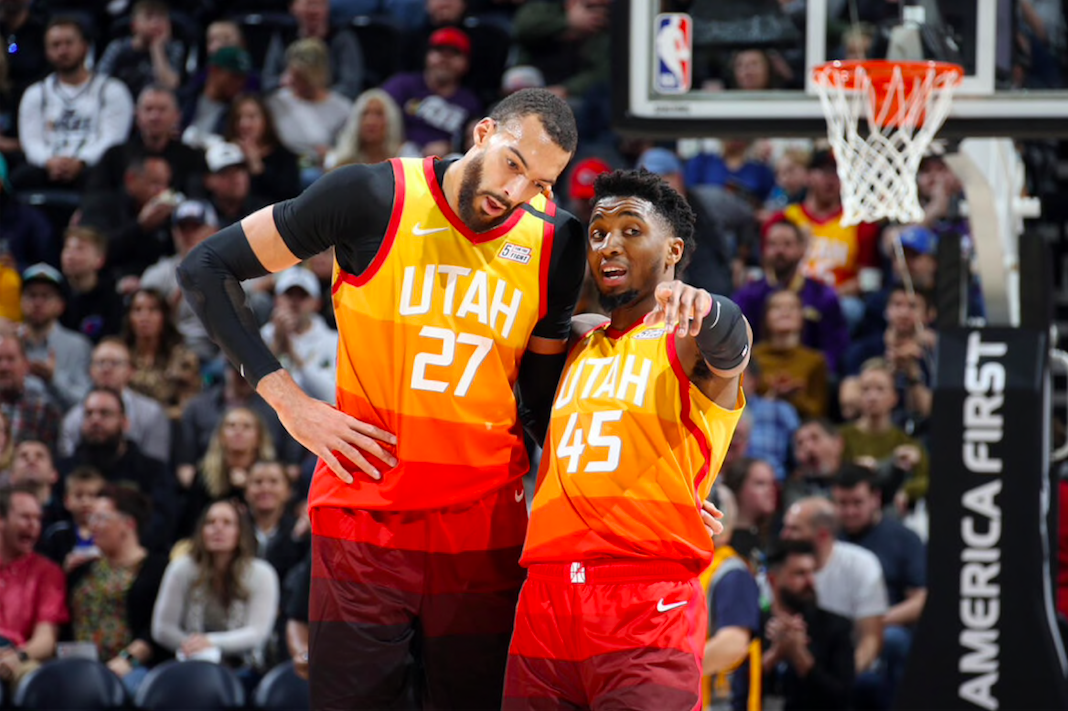The 240 Minutes Series Explained:
In the NBA there are 450 players under full contracts to start every season. These players consist of superstars, all-stars, average players, guys dealing with injuries, benchwarmers, rookies, ring-chasers, and whatever Hassan Whiteside is. Despite the contracts, draft capital, coaching, potential, friendships, and experience that all play a role in rotation minutes, there are only 240 minutes every game to go around and split amongst the players.
In this series, we cut through all of that. Join the fun as we dig into the rosters of every NBA team and project how many rotation minutes will be played by each player to begin the season. This takes into account all active injuries and thinks about the rosters in terms of which 9-12 players on each team will actually be playing for their respective team for the first few weeks of the regular season. In addition to this, we will discuss the positions that they will be playing, why their minutes per game total is calculated where it is, and showcase the quality of the player that is allotted those minutes. The “quality of player” tiers will look as such:
MVP Candidate – Top 10 player and potential to win MVP this season
All-NBA Candidate – Top 30 player and potential to be on an All-NBA Team this season
High-End Starter – Quality starter with potential to make the All-star game this season
Starter – Quality starter and is (roughly) a top 120 player this season
Low-End Starter – Starts but is not (roughly) a top 120 player this season
Elite 6th Man – Does not start but is a top (roughly) 120 player and could win 6MOTY this season
High-End Backup – Does not start but could if needed and perform well
Backup – Does not start but is a quality role player
Low-End Backup – Could see minutes during regular season but might not make playoff rotation
Without further ado:
Where Will the 240 Minutes on the Utah Jazz Go?
Donovan Mitchell PG/SG – All-NBA Candidate (32 minutes per game)
Before Mitchell’s injury in mid-April that cost him the last 16 games of the regular season, he was making his case to be on an All-NBA team. Mitchell was the leading scorer for a team that was 42-16 (72.4% win-rate) and he took a big step forward in terms of his play making and three-point shooting. Mitchell played 59% of his minutes at PG last season due to the Mike Conley injury, but should revert back to playing more shooting guard in 2021-2022. If Rudy Gobert is the defensive anchor for this team, Donovan Mitchell is the offensive anchor. He averaged 33.4 minutes per game last season, but on this incredibly deep roster, the goal should be to keep him closer to 32 minutes a contest to keep him fresh.
Rudy Gobert C – All-NBA Candidate (31 minutes per game)
Say what you want about Rudy Gobert, but despite all of his struggles on offense and collapse against the Clippers in the playoffs, he is still arguably the best defender in the entire NBA. Gobert has won three of the last four Defensive Player of the Year Awards (2018, 2019, and 2021). On top of this, he has accounted for three of the four highest rated defensive seasons in terms of defensive RAPTOR since 2013, joined only by 2016-2017 Draymond Green. Gobert averaged 14.3 points, 13.5 rebounds, and 2.7 blocks per game last season while leading the NBA in effective field goal percentage at 67.5%. He played 30.8 minutes per game last year and is set to anchor the Jazz defense yet again this upcoming year.
Bojan Bogdanovic SF/PF – Starter (31 minutes per game)
Bogdanovic is a true scorer who saw his offensive role on Utah increase as the season went along in 2020-2021. He averaged just 11.9 field goal attempts per game for the first two months of the season and averaged 15.2 field goal attempts the last two months of the season. Bojan fits the mold of the Utah Jazz, shooting three pointers early and often. The Jazz led the league with 43.0 three pointers a game and shot 38.9% (4th best in the NBA). Bogdanovic shot 39.0% from deep on 6.4 attempts in 30.8 minutes per game. It will be interesting to see how Quin Snyder divides the forward minutes between Bogdanovic, Ingles, O’Neale, and Rudy Gay.
Royce O’Neale SF/PF – Starter (30 minutes per game)
As one of the better glue guys in the NBA, O’Neale has been a perfect fit for the Jazz since becoming the full-time starter. His stat-line last season was unimpressive at just 7.0 points, 6.8 rebounds, and 2.5 assists per game, but O’Neale did all of the dirty work and actually played the most minutes of any Jazz player at 2,241 minutes. He played 31.6 minutes per game and probably won’t lead Utah in minutes again, but should be a lock for 30 minutes a night.
Mike Conley PG – Starter (29 minutes per game)
Mike Conley was a curious case in 2020-2021. He had a career year from beyond the arc, shooting 41.2% and made his first all-star appearance after 13 seasons in the league. At the same time, he failed to stay healthy for the 3rd time in four seasons and was hurt in both the regular season and playoffs for stretches. Regardless, the Jazz had no choice but to resign him and he is set to make $21 million this season. Conley averaged 29.4 minutes per game last year. Look for Quin Snyder to keep him right around 28-29 minutes nightly to try to keep him healthy.
Joe Ingles PG/SG/SF – Elite 6th Man (27 minutes per game)
While Joe Harris is generally regarded as the most efficient shooter in the entire league and led the NBA in 3-point percentage (47.4%), Joe Ingles shot an impressive 45.1% from deep as well. On top of that, his effective field goal percentage was nearly identical to Harris’ and Ingles actually had a higher true shooting percentage (67.2%) than Harris. I go into depth on how Ingles should have actually been the 6th man of the year in my article, “Meet Joe Ingles: The Most Legendary Shooting Role Player Ever”: https://studentunionsports.com/meet-joe-ingles-the-most-legendary-shooting-role-player-ever/ . Ingles is an extremely versatile player who can play PG, SG, or SF and is a very underrated defender. He averaged 27.9 minutes per game last season and looks to stay right around that mark this year.
Jordan Clarkson PG/SG – Elite 6th Man (25 minutes per game)
The reigning 6th man of the year had a career year in 2020-2021, erupting for 18.4 points in just 26.7 minutes per game. 18.4 points was the highest for all players who played under 31 minutes per game last season. While Joe Ingles would have been my personal pick for 6th man of the year, there’s no doubt that Clarkson is one of the best microwave scorers in the entire league. With a hopefully healthy Mike Conley, Clarkson should see a few less minutes this year, but won’t have any problem getting up plenty of shots.
Rudy Gay SF/PF – Backup (15 minutes per game)
The Jazz did not bring in any dazzling new free agents, but after inking in Mike Conley long-term, they did have a couple under-the-radar signings that were very solid. Rudy Gay was the most notable signing, as the aging forward has averaged double-digit points every season of his 15-year NBA career. Last year, he averaged 11.4 points and 4.8 rebounds in 21.6 minutes with the Spurs. Rudy Gay will look to fill in the backup PF role that Goerges Niang had last season and should play a consistent 15-16 minutes a night.
Hassan Whiteside C – Backup (12 minutes per game)
Hassan Whiteside is one of the weirdest cases in the NBA as no one knows if he is really good or complete garbage. The man who once recorded a 14-point, 13-rebound, 12-block triple-double in under 25 minutes and led the league at 14.1 rebounds per game during the 2016-2017 season also looks lost on the court consistently and his effort is constantly questioned. The truth likely lies somewhere in the middle and he could simply be a solid backup with flaws similar to an Enes Kanter. Whiteside averaged 8.1 points and 6.0 rebounds in 15.2 minutes per game last season with the Kings. In 2021-2022, he will be filling in the 12-15-minute backup center role that Derrick Favors played last season.
Jared Butler PG/SG – Backup (4 minutes per game)
After the Baylor Bears won the national championship behind Jared Butler’s 22 points and 7 assists, many analysts thought that Butler could sneak all the way up into the lottery, ranked as high as #11 on John Hollinger’s list of top players for the NBA draft. After not being permitted to play or participate in pre-draft workouts due to a heart-issue, Butler’s draft stock plummeted. While he was eventually cleared to play, he fell all the way to the Jazz at the 40th pick. Unfortunately, he will be buried behind Mitchell, Conley, Clarkson, and Ingles but ultimately he is still a lottery talent worth taking a look at.
Eric Paschall PF/C – Low-End Backup (4 minutes per game)
With Rudy Gobert and Hassan Whiteside, as well as Utah’s 2020 first round pick, Udoka Azubuike, all fitting into the mold of true centers who cannot shoot, Eric Paschall was a nice cheap pickup who could play small-ball 5 for the Jazz. Despite being just 6’6”, Paschall played 65% of his minutes at center last season for the Warriors and shot an underwhelming but passable 33.3% from deep. He averaged 17.4 minutes per game last season, but will simply be a change of pace big for the Jazz in 2021-2022.
Projected Nightly Depth Chart:
PG: Mike Conley/Donovan Mitchell/Jared Butler
SG: Donovan Mitchell/Jordan Clarkson/Jared Butler
SF: Royce O’Neale/Joe Ingles/Bojan Bogdanovic
PF: Bojan Bogdanovic/Rudy Gay/Eric Paschall
C: Rudy Gobert/Hassan Whiteside/Eric Paschall
Not in Initial Rotation:
Udoka Azubuike C
Miye Oni SG
Elijah Hughes SF
Jarrell Brantley PF (QO)
Trent Forrest SG (Two-Way)
MaCio Teague (Exhibit-10)




